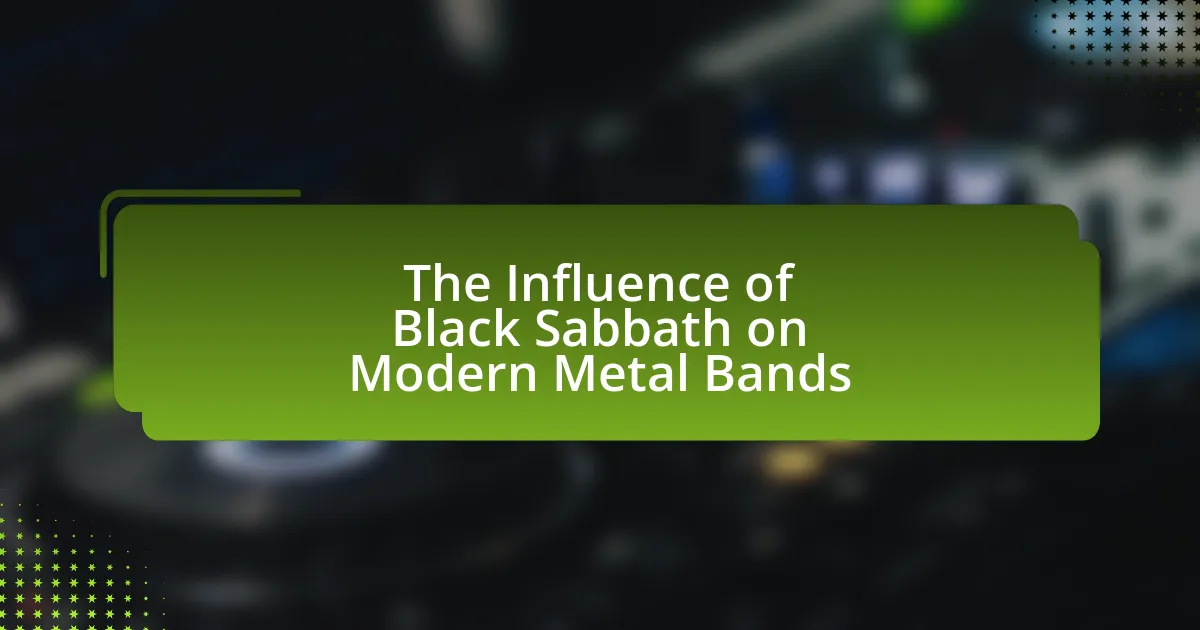Black Sabbath is recognized as a foundational influence on modern metal bands, having established key elements such as heavy guitar riffs, dark lyrical themes, and a powerful sound that define the genre. Their self-titled debut album in 1970 marked the birth of heavy metal, introducing innovative musical techniques and thematic depth that continue to resonate in contemporary music. The article explores how Black Sabbath’s pioneering approach to songwriting, production, and stage presence has shaped various metal subgenres, including doom and thrash metal, while also highlighting their lasting impact on today’s metal scene and the ways modern bands honor their legacy. Key albums and tracks from Black Sabbath are examined for their significance in influencing the sound and identity of modern metal.

What is the Influence of Black Sabbath on Modern Metal Bands?
Black Sabbath has profoundly influenced modern metal bands by establishing the foundational sound and themes of heavy metal music. Their use of distorted guitar riffs, dark lyrical content, and a heavy, slow tempo set a precedent that many contemporary metal bands emulate. For instance, bands like Metallica and Slayer have cited Black Sabbath as a key influence in their musical development, particularly in their approach to songwriting and stage presence. The release of Black Sabbath’s self-titled debut album in 1970 is often regarded as the birth of heavy metal, showcasing elements such as power chords and ominous themes that are now staples in the genre. This legacy is evident in the music of modern bands, which continue to draw inspiration from Black Sabbath’s innovative sound and aesthetic.
How did Black Sabbath shape the sound of modern metal?
Black Sabbath fundamentally shaped the sound of modern metal by pioneering heavy guitar riffs, dark lyrical themes, and a distinctively heavy sound that emphasized power and aggression. Their self-titled debut album, released in 1970, introduced a slower, heavier style that contrasted sharply with the prevailing rock music of the time, laying the groundwork for the heavy metal genre. The band’s use of distorted guitar tones, particularly Tony Iommi’s innovative riffing techniques, influenced countless metal bands that followed, establishing a template for the genre. Additionally, Ozzy Osbourne’s vocal style and the band’s incorporation of horror and occult themes in their lyrics set a precedent for the thematic content of modern metal music.
What musical elements did Black Sabbath introduce that are prevalent in modern metal?
Black Sabbath introduced several musical elements that are now prevalent in modern metal, including heavy guitar riffs, dark lyrical themes, and a slower tempo. Their use of distorted guitar tones, particularly in songs like “Iron Man,” set a foundation for the heavy sound that characterizes much of modern metal. Additionally, Black Sabbath’s exploration of themes such as horror and existentialism in their lyrics influenced countless bands, establishing a template for the genre’s thematic depth. The band’s incorporation of blues scales and minor keys also contributed to the darker, more aggressive sound that is a hallmark of contemporary metal music.
How did Black Sabbath’s lyrical themes influence modern metal bands?
Black Sabbath’s lyrical themes significantly influenced modern metal bands by introducing darker, more complex subject matter that explored themes of horror, existentialism, and social issues. Their lyrics often delved into topics such as war, mental illness, and the occult, setting a precedent for future metal artists to tackle similarly heavy and thought-provoking subjects. For instance, bands like Metallica and Slipknot have drawn inspiration from Black Sabbath’s exploration of inner turmoil and societal critique, evident in their own lyrics that address personal and collective struggles. This thematic depth has become a hallmark of modern metal, demonstrating Black Sabbath’s lasting impact on the genre’s lyrical landscape.
Why is Black Sabbath considered a pioneer in the metal genre?
Black Sabbath is considered a pioneer in the metal genre because they were among the first bands to incorporate heavy guitar riffs, dark themes, and a powerful sound that defined heavy metal music. Their self-titled debut album, released in 1970, featured distorted guitar tones and ominous lyrics, setting a template for future metal bands. The song “Iron Man” exemplifies their innovative use of heavy instrumentation and thematic depth, influencing countless artists in the genre. Additionally, Black Sabbath’s unique blend of blues rock and horror-inspired lyrics established a new musical direction that would shape the evolution of heavy metal throughout the 1970s and beyond.
What historical context surrounded the emergence of Black Sabbath?
Black Sabbath emerged during a period marked by social upheaval and cultural transformation in the late 1960s and early 1970s. The band’s formation in 1968 coincided with the decline of the counterculture movement and the rise of darker themes in music, reflecting societal anxieties related to war, civil rights, and economic instability. The Vietnam War, civil rights protests, and a growing disillusionment with traditional values influenced the band’s lyrical content and musical style, which incorporated heavy guitar riffs and ominous themes. This context established Black Sabbath as pioneers of heavy metal, as they addressed the darker aspects of human experience, setting a precedent for future metal bands.
How did Black Sabbath’s image and branding impact future metal bands?
Black Sabbath’s image and branding significantly shaped the identity of future metal bands by establishing a dark, rebellious aesthetic that became a hallmark of the genre. Their use of occult themes, heavy guitar riffs, and a theatrical stage presence set a precedent for bands like Metallica and Slayer, who adopted similar visual and musical elements. The band’s self-titled debut album in 1970 is often credited with laying the groundwork for heavy metal, influencing the sound and style of countless artists that followed. Additionally, Black Sabbath’s branding as pioneers of a darker, more aggressive form of rock music encouraged subsequent bands to explore themes of horror and existentialism, further embedding these motifs into the metal genre’s identity.
What are some key albums by Black Sabbath that influenced modern metal?
Key albums by Black Sabbath that influenced modern metal include “Black Sabbath” (1970), “Paranoid” (1970), “Master of Reality” (1971), and “Heaven and Hell” (1980). The self-titled debut album “Black Sabbath” introduced heavy guitar riffs and dark themes, establishing the blueprint for heavy metal. “Paranoid” solidified their impact with tracks like “Iron Man” and “War Pigs,” which are often cited as foundational metal songs. “Master of Reality” further developed the genre with its use of downtuned guitars and themes of despair. “Heaven and Hell,” featuring Ronnie James Dio, marked a significant evolution in sound and songwriting, influencing countless bands in the heavy metal genre. These albums collectively shaped the musical landscape and inspired generations of metal musicians.
Which specific tracks from Black Sabbath are frequently cited by modern metal bands?
“Black Sabbath’s tracks ‘Iron Man,’ ‘Paranoid,’ and ‘War Pigs’ are frequently cited by modern metal bands.” These songs are foundational to the genre, influencing the sound and style of numerous contemporary artists. For instance, ‘Iron Man’ is often referenced for its iconic riff and heavy sound, while ‘Paranoid’ is noted for its fast tempo and catchy melody, both of which have been emulated in various modern metal subgenres. ‘War Pigs’ is recognized for its thematic depth and complex structure, inspiring bands to explore similar lyrical and musical intricacies. The enduring legacy of these tracks is evident in their consistent presence in the setlists and influences of modern metal acts.
How did the production techniques used by Black Sabbath affect modern metal recordings?
The production techniques used by Black Sabbath significantly influenced modern metal recordings by establishing a heavier sound and innovative studio practices. Their use of distortion, particularly on guitar, created a thick, powerful tone that became a hallmark of metal music. Additionally, Black Sabbath’s incorporation of ambient soundscapes and layered instrumentation set a precedent for atmospheric elements in metal production. The band’s approach to recording, which often included live takes and minimal overdubbing, emphasized raw energy and authenticity, a practice that many contemporary metal bands adopt to capture a similar intensity. This foundational work in production has led to the evolution of various subgenres within metal, showcasing the lasting impact of Black Sabbath’s techniques on the genre’s sonic landscape.
How did Black Sabbath’s influence manifest in specific modern metal subgenres?
Black Sabbath’s influence is evident in modern metal subgenres such as doom metal, stoner metal, and heavy metalcore. Doom metal directly inherits Black Sabbath’s slow tempos, dark themes, and heavy guitar riffs, exemplified by bands like Electric Wizard and Sleep, who emulate the band’s signature sound. Stoner metal, represented by groups like Kyuss and Fu Manchu, incorporates Sabbath’s heavy, fuzzy guitar tones and psychedelic elements, reflecting the band’s early experimentation with sound. Additionally, heavy metalcore bands, such as Killswitch Engage, draw from Black Sabbath’s heavy riffs and melodic structures, showcasing the band’s foundational impact on the genre’s evolution. These manifestations highlight Black Sabbath’s role as a cornerstone in the development of various modern metal subgenres.
What characteristics of doom metal can be traced back to Black Sabbath?
Doom metal characteristics that can be traced back to Black Sabbath include heavy, down-tuned guitar riffs, slow tempos, and dark, brooding lyrical themes. Black Sabbath’s self-titled debut album, released in 1970, featured these elements prominently, establishing a template for the genre. The band’s use of distorted guitar tones and minor keys created a sense of heaviness and foreboding, which became foundational in doom metal. Additionally, the lyrical focus on themes of despair, horror, and the occult, as exemplified in songs like “Black Sabbath” and “N.I.B.,” directly influenced subsequent doom metal bands, solidifying Black Sabbath’s role as a pioneer of the genre.
How did Black Sabbath’s sound evolve into the doom metal genre?
Black Sabbath’s sound evolved into the doom metal genre primarily through their use of slower tempos, heavy guitar riffs, and dark lyrical themes. Their self-titled debut album, released in 1970, featured a heavy, distorted guitar sound and ominous lyrics that laid the groundwork for doom metal. Songs like “Black Sabbath” exemplified this shift with their haunting atmosphere and themes of despair, which became characteristic of the genre. Additionally, the band’s incorporation of blues elements and minor keys contributed to the heavy, brooding sound that defines doom metal. This evolution was further solidified in subsequent albums, such as “Paranoid” and “Master of Reality,” where the band continued to explore darker themes and heavier instrumentation, influencing countless bands in the doom metal scene.
Which modern doom metal bands cite Black Sabbath as an influence?
Modern doom metal bands that cite Black Sabbath as an influence include Electric Wizard, Sleep, and Pallbearer. Electric Wizard, known for their heavy, sludgy sound, has openly acknowledged Black Sabbath’s impact on their music, particularly in their use of dark themes and heavy riffs. Sleep, with their iconic album “Dopesmoker,” draws heavily from Black Sabbath’s slow tempos and heavy guitar work. Pallbearer, recognized for their melodic approach to doom metal, also credits Black Sabbath for shaping their sound, especially in their incorporation of atmospheric elements and heavy, down-tuned guitars. These bands exemplify the lasting influence of Black Sabbath on the modern doom metal genre.
In what ways did Black Sabbath impact the development of thrash metal?
Black Sabbath significantly impacted the development of thrash metal by establishing a heavier sound and darker themes that became foundational for the genre. Their use of distorted guitar riffs, complex song structures, and aggressive rhythms influenced thrash metal bands such as Metallica and Slayer, who adopted and intensified these elements. The band’s 1970 self-titled debut album introduced a slower, heavier style that contrasted with the prevailing rock music of the time, paving the way for the faster tempos and intricate guitar work characteristic of thrash metal. Additionally, Black Sabbath’s lyrical focus on horror, war, and societal issues resonated with thrash metal’s thematic concerns, further solidifying their influence in shaping the genre’s identity.
What elements of Black Sabbath’s music are evident in thrash metal bands?
Black Sabbath’s music elements evident in thrash metal bands include heavy guitar riffs, dark lyrical themes, and a focus on aggressive rhythms. Thrash metal bands like Metallica and Slayer have adopted Black Sabbath’s signature heavy, distorted guitar sound, which is characterized by down-tuned guitars and powerful, palm-muted riffs. Additionally, the thematic exploration of violence, war, and societal issues in Black Sabbath’s lyrics has influenced thrash metal’s often confrontational and dark lyrical content. The fast tempos and complex song structures in thrash metal also reflect the rhythmic intensity found in Black Sabbath’s work, particularly in tracks like “Iron Man” and “War Pigs,” which showcase a blend of slow, heavy sections and faster, more aggressive passages.
How did Black Sabbath’s approach to songwriting influence thrash metal musicians?
Black Sabbath’s approach to songwriting significantly influenced thrash metal musicians by introducing heavy, down-tuned guitar riffs, dark lyrical themes, and a focus on rhythm and tempo. Their use of power chords and a slower, heavier sound laid the groundwork for the aggressive style that thrash metal embodies. Bands like Metallica and Slayer adopted these elements, incorporating fast tempos and complex song structures while maintaining the thematic darkness that Black Sabbath pioneered. The direct lineage can be seen in Metallica’s early work, which features similar riffing techniques and lyrical content that echoes Black Sabbath’s influence.
What are the lasting effects of Black Sabbath’s influence on today’s metal scene?
Black Sabbath’s influence on today’s metal scene is profound, establishing foundational elements such as heavy guitar riffs, dark themes, and a distinct sound that many contemporary metal bands emulate. Their pioneering use of power chords and down-tuned guitars set a standard for the genre, influencing bands like Metallica and Slayer, who adopted similar musical techniques. Additionally, Black Sabbath’s lyrical focus on existential dread, horror, and societal issues paved the way for the thematic depth found in modern metal, as seen in the works of bands like Slipknot and Ghost. Their impact is further evidenced by the genre’s evolution, where elements of doom metal and stoner rock, both heavily inspired by Black Sabbath, continue to thrive in today’s music landscape.
How do contemporary metal bands honor Black Sabbath’s legacy?
Contemporary metal bands honor Black Sabbath’s legacy by incorporating heavy riffs, dark themes, and a focus on atmosphere in their music. Bands like Ghost and Mastodon explicitly cite Black Sabbath as a foundational influence, emulating their signature sound characterized by down-tuned guitars and ominous lyrics. Additionally, many modern metal acts pay tribute through covers of Black Sabbath songs, showcasing their enduring impact on the genre. For instance, the band Anthrax has covered “Iron Man,” demonstrating how Black Sabbath’s work continues to resonate with new generations of musicians.
What tribute albums or covers have been released by modern metal bands?
Modern metal bands have released several tribute albums and covers honoring Black Sabbath, including “Nativity in Black” (1994) and “Nativity in Black II” (2000), which feature various artists covering classic Black Sabbath tracks. Additionally, the album “The Metallica Blacklist” (2021) includes a cover of “Iron Man” by the band Ghost, showcasing the ongoing influence of Black Sabbath on contemporary metal. These albums highlight the enduring legacy of Black Sabbath within the modern metal scene.
How do live performances of modern metal bands reflect Black Sabbath’s influence?
Live performances of modern metal bands reflect Black Sabbath’s influence through their heavy use of dark themes, theatricality, and powerful guitar riffs. Modern bands often incorporate elements such as extended guitar solos and a focus on stage presence, which are hallmarks of Black Sabbath’s live shows. For instance, the use of ominous imagery and elaborate stage setups in performances by bands like Ghost and Slipknot echoes the atmospheric elements that Black Sabbath pioneered. Additionally, the incorporation of heavy, downtuned guitar sounds in live performances directly traces back to Black Sabbath’s foundational work in shaping the heavy metal genre. This connection is evident in the way modern bands structure their setlists, often including slower, heavier tracks that emphasize the same brooding intensity that characterized Black Sabbath’s music.
What lessons can modern metal bands learn from Black Sabbath’s career?
Modern metal bands can learn the importance of innovation and authenticity from Black Sabbath’s career. Black Sabbath pioneered heavy metal by blending dark themes with powerful riffs, establishing a unique sound that resonated with audiences. Their willingness to experiment with musical styles, as seen in albums like “Sabbath Bloody Sabbath,” demonstrates the value of pushing creative boundaries. Additionally, Black Sabbath’s commitment to their artistic vision, despite commercial pressures, underscores the significance of staying true to one’s identity in the music industry. This approach has proven effective, as it has allowed them to maintain a lasting legacy and influence on subsequent generations of metal musicians.
How can new metal bands incorporate Black Sabbath’s principles into their music?
New metal bands can incorporate Black Sabbath’s principles into their music by embracing heavy, downtuned guitar riffs, dark lyrical themes, and a strong emphasis on atmosphere. Black Sabbath’s use of power chords and minor keys created a distinctive sound that defined heavy metal; new bands can replicate this by focusing on similar musical structures. Additionally, Black Sabbath’s exploration of topics such as existentialism, horror, and social issues in their lyrics can inspire new bands to write thought-provoking content that resonates with listeners. The band’s pioneering use of dynamics, shifting between quiet verses and explosive choruses, can also be emulated to enhance emotional impact. By integrating these elements, new metal bands can honor Black Sabbath’s legacy while contributing to the genre’s evolution.
What best practices can be derived from Black Sabbath’s approach to artistry and performance?
Black Sabbath’s approach to artistry and performance emphasizes authenticity, innovation, and a strong connection with their audience. Their commitment to creating a unique sound, characterized by heavy guitar riffs and dark themes, set a standard for originality in metal music. This dedication to authenticity encourages modern bands to develop their own distinct identities rather than conforming to trends.
Moreover, Black Sabbath’s theatrical stage presence and use of visual elements in performances highlight the importance of engaging the audience beyond just the music. This practice fosters a deeper emotional connection, which is crucial for modern bands aiming to create memorable live experiences.
Additionally, their willingness to explore and push the boundaries of musical genres demonstrates the value of experimentation in artistry. By blending elements of blues, rock, and classical music, Black Sabbath paved the way for future artists to innovate and evolve their sound.
These best practices—authenticity, audience engagement, and musical experimentation—serve as foundational principles for modern metal bands seeking to establish their own legacy in the genre.


